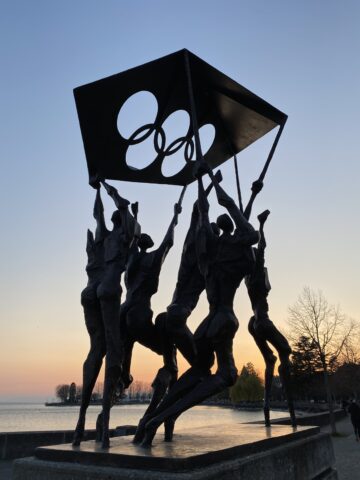SFT Judgment 4A_413/2019, judgment of 28 October 2019
A.______ (Sun Yang) v. World Anti-Doping Agency (WADA) & Fédération Internationale de Natation (FINA), Appeal against the decision rendered on 26 July 2019 by the Court of Arbitration for Sport (CAS 2019/A/6148).
1. The background facts
The background case involves the celebrity swimmer Sun Yang (the “Swimmer”, Appellant), who was accused of an anti-doping rule violation due to the unsuccessful attempt to take blood and urine samples during an unannounced doping control at his house, and the subsequent lifting of charges by the FINA Anti-Doping Commission. Following the FINA decision, WADA appealed to the CAS in Lausanne. Following the request of the Swimmer, the CAS held its first public hearing after the modification of Article R57 of the CAS Code that itself was instigated by the ECHR Decision in the Pechstein matter in October 2018.
2. The grounds for appeal to the Swiss Federal Tribunal
The Swimmer contested the capacity of WADA’s counsel to act as its representative due to the existence of a conflict of interest (based on the previous involvement of said counsel with the FINA Legal Commission). After the filing of the Appeal Brief by WADA (represented by the same counsel whose capacity was contested by the Appellant), the latter filed an appeal requesting the dismissal of the CAS appeal due to its late filing.
Interestingly, the Swimmer filed an appeal with the Federal Tribunal directed against a non-final award, namely a decision on challenge the arbitrator appointed by WADA, in which the Appellant reiterated his request to consider the appeal inadmissible since it was filed by a person that lacked the capacity to represent WADA due to a conflict of interest. In other words, the Appellant based his appeal on an alleged lack of jurisdiction ratione temporis of the arbitral tribunal due to the late filing of the appeal.
3. The Inadmissibility of the Appeal
The decision on the capacity to act as a lawyer for a party is neither an award on jurisdiction nor on the composition of the tribunal.
The Federal Tribunal reiterated the types of awards against which it is admissible to file an appeal. Apart from the final awards (possible to appeal based on all the exhaustively enumerated grounds of Article 190 (2) PILA), it is also possible to attack an interlocutory award but only for matters directly related to the composition or jurisdiction of the arbitral tribunal.
The Appellant attempted to base his appeal on a jurisdictional ground, in the sense that the incapacity of WADA’s counsel to act as such should render the filing of the appeal late and thus inadmissible. Since the statement of appeal and the appeal brief were not validly filed in due time, the CAS should not have jurisdiction ratione temporis to rule on the appeal.
The Federal Tribunal first concluded that the matter of incapacity to act as a lawyer leads to a decision that is neither related to jurisdiction nor to the irregular constitution of the panel, hence it is impossible to file an immediate appeal and one needs to wait until the issuance of the final award.

Capacity to act as a Party’s Representative and Analogy to civil Proceedings
Furthermore, the Federal Tribunal drew an interesting analogy between the arbitral and civil proceedings, whereby in case of lack of capacity to act as a party’s representative, the court must in principle set a time limit for the party to remedy such requirement before declaring such appeal inadmissible.
Late Filing of the Appeal to the CAS: a Question of Admissibility, Full Stop.
This judgment gave the opportunity to the Swiss Federal Tribunal to finally answer a question that had been left open since 2012 (at 3.3.2 ff.)
Specifically, it examined the question of the late filing of an appeal to the CAS and concluded that this is not a question related to jurisdiction but rather to the admissibility of the appeal, as was previously suggested by the doctrine and argued (but never answered in a clear way) by the Federal Tribunal until this case. For the first time it distinguished between “typical arbitration” and “atypical” (i.e., sports) arbitration: in the latter case, whether a party is entitled to challenge the decision taken by the body of a sports federation on the basis of statutory and procedural rules, does not concern the jurisdiction of the arbitral tribunal but is a question of standing (a procedural issue that the Federal Tribunal does not review in appeal). The practical difference is essentially the wider power of review by the arbitral tribunal that cannot subsequently be reviewed by the Federal Tribunal and the incapacity of a party to file an appeal to the Federal Tribunal before the issuance of the final award.
In other words, the non-respect of the time limit to appeal against a decision to the CAS (under Art. R49 CAS Code) should not entail the lack of jurisdiction (ratione temporis) of the CAS, but rather the loss of the right to file a claim. Indeed, if it were sufficient for a party to merely wait for the expiry of the time limit for appeal of art. R49 of the Code in order to seize the Swiss state courts, this party would be able to bypass the jurisdiction of the arbitral tribunal by its inaction alone.
The issue of capacity to act as a party’s representative should be raised immediately.
The Federal Tribunal also rejected the appeal as inadmissible because the Appellant’s argument as to WADA’s counsel’s incapacity to represent WADA should have been raised immediately – similarly to the petition for challenge of an arbitrator – in accordance with the principle of good faith.
Note: The full judgment is available in French at the website of the Swiss Federal Tribunal www.bger.ch. The English translations of the international arbitration decisions rendered by the Swiss Federal Tribunal (from French, German and Italian) are available on the website www.swissarbitrationdecisions.com , operated jointly by Dr. Despina Mavromati and Dr. Charles Poncet as a service to the international arbitration community.





